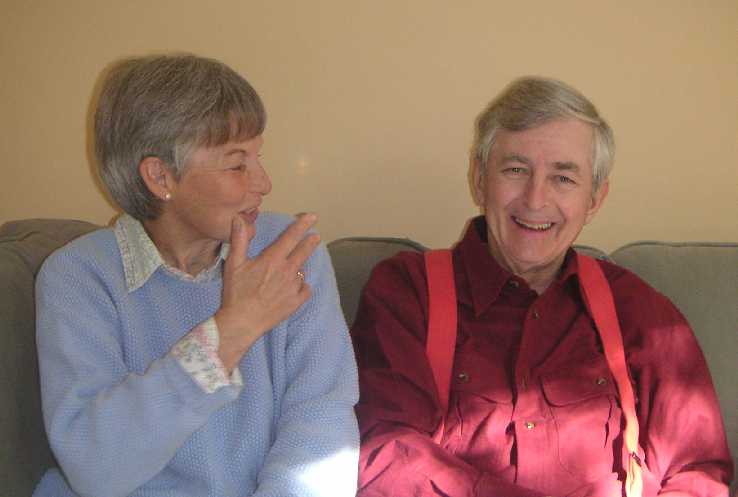Marsha and humble September 30, 2007
Your generosity now enables you to surprise that special someone with a "No Things Considered" T-Shirt (Hanes L/G/G)
If you specify no other U. S. address, it will be sent to the address on your check.
Here's a new special offer to thank you for your donation that supports Maine Private Radio.
Robert Karl Skoglund
It will be a vacation you'll never forget when your significant other is expecting a week on Bermuda
and you end up at The humble Farmer's Bed & Breakfast in a pouring rain.
Check out our B&B web page.
+
This is a rough draft of Rants for your Maine Private Radio show for March 22, 2015.
+
1. If you were to Google The New York State Society for Respiratory Care you might be surprised at what you will find. If you read through this web page, as I did, you will learn that the Student Sputum Bowl final competition is held annually each fall during the South Eastern Chapter Symposium. I’d like to know a little bit more about this Sputum Bowl final competition. Is it something particular to New York, or does this Sputum Bowl final competition exist in other states? And exactly what does the competition consist of? I’m the humble farmer at gmail dot com and I’d like to hear from you if you can bring up anything on the topic. Do you remember my telling you that my friend Winky once worked as a laboratory assistant in our local department of respiratory care? His job was to photograph samples of mucus for microscopic analysis and he got very good at it. But you will remember that his girlfriend’s father threw him out of the house when he heard about it. The old man said he didn’t want his daughter hanging out with no film phlegm artist.
+
2. Years and years and years ago I bought a book called Frog and Toad Are Friends. It is a book written by a very good and talented man whose name was Arnold Lobel and I bought it because I recall enjoying Frog and Toad Are Friends back when I was very young, probably when I was teaching grade school. But now, forty plus years later and hopefully a more discriminating reader, I found a couple of disturbing things. To get an exhausted Toad out of bed after only half a winter’s nap, Frog tears the February, March and April pages off Toad’s calendar. Seeing May on his calendar Toad thinks that spring has arrived, gets out of bed, and goes for a walk with the crafty Frog. The message to young people is clear: if your friends will not listen to reason, you can get your own way by employing deceit. Not that Toad himself would be able to cast the first stone, because when he couldn’t find his button he jumped up and down and screamed. Do you want your youngsters to learn that a temper tantrum is an acceptable response to frustration? However, on the positive side of Frog and Toad Are Friends, your children will preview the shameful reality we all live with in the United States today, because when Frog mailed his next door neighbor a letter, Toad didn’t get it until four days later.
+
3. Did you know that the life expectancy of people varies from country to country? According to some fairly recent figures, in Japan, the average life expectancy for men is 85. In Iceland it is 81. Way down on the list at number 36 is the United States where men can be expected to live 77 years. Because my lips never touch alcohol, tobacco or rice, I have outlived the typical American man and have finally managed to be above average in something. These facts are hardly interesting enough in themselves to warrant your attention, but get this. --- On another page we read that people who live on mountain tops outlive their neighbors in the polluted valleys. Because I used to have many fleecy friends I was not surprised to read that in a recent year there were only three deaths related to sheep and goat farming. But what really blew me out of my chair was the fact that there are no statistical figures on vegans who own apple computers. It seems that not one of them has ever died.
+
4. You might guess that nobody in the world has ever heard of Annie Dillard's Pilgrim at Tinker Creek but you would be wrong. A friend mentioned that this book was being discussed by some literary or social breakfast group in Rockland so I looked it up. No wonder I've never heard of Tinker Creek or Annie Dillard. Tinker Creek was written 10 years after I baptized classmates in a Gorham American Lit class with water I'd brought home from Walden Pond. Yes, I had even finished graduate school before it was written. Don’t you wish people would stop writing books. How can anyone be expected to keep up?
+
5. You must certainly remember Clifton Fadiman’s Lifetime Reading Plan. It was around 1960 that you could sign up for Clifton Fadiman’s lifetime reading program. Do you know if it made allowances for anything that was to be written after 1960? I never joined as it sounded like a grim way to spend one's life. The inevitable end was clearly delineated as Mr. Fadiman certainly found out at the age of 95 when he put a bookmark in Madam Bovary and never picked her up again.
+
6. We all know people who plan things days and weeks and months ahead. They write these things down on calendars or in little notebooks. They know exactly what they are going to do every day. Any change in their schedule throws them for a loop. An existence like that is not a life. It is the chronicle of an inmate in a maximum security federal prison. Some of us are very happy to get out of bed in the morning with nothing more on the agenda than "Eat my rolled oats and take a shower.”
+
7. Man is a creature of habit, if I may coin a phrase. Some of us are distressed by even minuscule variations in our breakfast and bathing routines. It is not until we have completed these imperative functions that we extend our welcoming arms and are open for business at 0630. One morning the Direct TV did not work. I don't know if it (press ages) presages WWIII or if something has burned out in the guts of our machine. There are people who cannot sit on the john without a book in hand and there are people who cannot eat their morning oats (which requires two hands) unless they are learning from a colored screen how many of their neighbors in the next town were shot with a handgun the night before --- and I am both of them. What do you do when your power or your TV go out?
+
8. Before getting out of bed one morning, I finished reading the last five pages in Thomas Kuhn's controversial 1962 book, The Structure of Scientific Revolutions. This is a remarkable achievement for me as I usually get half way through a book and move on to another. Although I would be hard pressed to write an academic review of this book, I think I understand at least one of his basic premises and I'm glad I was able to write my initials and the date and time on the last page. In too many places Professor Kuhn lost me. I could read all, but perhaps two of his words, but I still had no idea of what he was talking about. His train of thought was as hard to follow as that of an 18th century philosopher. On the other hand, outside of a few very necessary but obscure scientific vocabulary items, Stephen Hawking uses simple language that is geared to the layman. And I can't understand him, either. Professor Kuhn added to my TV-less distress that morning by forcing me to realize for the umpteenth time over the past 60 years that I have never been able to memorize the definitions of ontology or epistemology. Perhaps it has never been necessary to do so, so I have contented myself with having to look them up in the dictionary time after time whenever pressed, even as I have done countless times with complement and compliment. What a curious and complicated thing is the human brain. It will permit some of us to memorize the melody and changes to hundreds of songs, learn to read half a dozen languages and yet not let us recognize faces or spell.
+
9. A Harvard man sat in my kitchen the other day and, with a casual sideways glance at the exotic phone in the hand of his beautiful young wife, boasted that he had neither cell phone nor ipad. Of course he doesn’t need a cell phone. Do you think Martha Stewart’s husband would go hungry if he couldn’t even warm up a pan of beans?
+
10. One morning a joyous message appeared on our answering machine. Although I might someday forget the message I will not soon forget the manner in which it was delivered for it was a technological first. The message we got today was a text message that was articulated by our phone. It was from the man who thanked us, and said that around midnight he had found his dog. It is nice that technology enables us to even retrieve the mysterious text messages. To my knowledge, this is the first text message I have ever received. It must go on record We have all heard of the space shuttle, but I wouldn’t know how to buckle myself in and navigate it. Most people have heard of the hand-held telephone that sends text messages, and I wouldn’t know how to operate that, either. Am I a member of the last generation to occupy this wonderful planet without ever having sent a text message? I do not have a mobile telephone and I do not want one. It makes me a bit different from my grandfather Gilchrest who died in 1927, always wanting a radio but never owning one.
+
11. Dr. Olga says, “I text all the time. It allows the texter to control the degree of involvement with the recipient in a way one could not on the phone or in an email. Why avoid this? It is a polite way of keeping people at arm's length. It avoids quarrels.
+
12. Nowadays we not only exchange letters electronically with our friends, but also short movies called video files. One showed a deer that had broken through thin ice in a shallow pond. A helicopter hovered over the deer. The downward prop thrust blew the deer onto the ice and across the ice to the bank where the poor little thing ran into the woods. You know that as soon as the helicopter is gone, that deer is going to walk back out on the ice and fall into the pond again.
+
+
785 River Road
St. George, ME 04860
(207) 226-7442
thehumblefarmer@gmail.com
www.TheHumbleFarmer.com
© 2015 Robert Karl Skoglund

